-
LM25574-Q1 42-V, 0.5-A Step-Down Switching Regulator
- 1 Features
- 2 Applications
- 3 Description
- 4 Revision History
- 5 Pin Configuration and Functions
- 6 Specifications
- 7 Detailed Description
- 8 Application and Implementation
- 9 Layout
- 10Device and Documentation Support
- 11Mechanical, Packaging, and Orderable Information
- IMPORTANT NOTICE
Package Options
Mechanical Data (Package|Pins)
- PW|16
Thermal pad, mechanical data (Package|Pins)
Orderable Information
LM25574-Q1 42-V, 0.5-A Step-Down Switching Regulator
1 Features
- Qualified for Automotive Applications
- AEC-Q100 Qualified With the Following Results:
- Device Temperature Grade 1: –40°C to +125°C Ambient Operating Temperature
- Integrated 42-V, 750-mΩ N-Channel MOSFET
- Ultra-Wide Input Voltage From 6 V to 42 V
- Adjustable Output Voltage as Low as 1.225 V
- 1.5% Feedback Reference Accuracy
- Operating Frequency Adjustable Between 50 kHz and 1 MHz With Single Resistor
- Master or Slave Frequency Synchronization
- Adjustable Soft-Start
- Emulated Current Mode Control Architecture
- Wide Bandwidth Error Amplifier
- Built-In Protection
- TSSOP-16 Package
- Create a Custom Design Using the LM25574-Q1 With the WEBENCH® Power Designer
2 Applications
- Industrial
3 Description
The LM25574-Q1 is an easy to use buck regulator which allows design engineers to design and optimize a robust power supply using a minimum set of components. Operating with an input voltage range of 6 V to 42 V, the LM25574-Q1 delivers 0.5-A of continuous output current with an integrated 750-mΩ N-Channel MOSFET. The regulator utilizes an Emulated Current Mode architecture which provides inherent line regulation, tight load transient response, and ease of loop compensation without the usual limitation of low-duty cycles associated with current mode regulators. The operating frequency is adjustable from 50 kHz to 1-MHz to allow optimization of size and efficiency. To reduce EMI, a frequency synchronization pin allows multiple IC’s from the LM(2)557x family to self-synchronize or to synchronize to an external clock. The LM25574-Q1 guarantees robustness with cycle-by-cycle current limit, short-circuit protection, thermal shut-down, and remote shut-down. The device is available in a TSSOP-16 package.
Device Information(1)
| PART NUMBER | PACKAGE | BODY SIZE (NOM) |
|---|---|---|
| LM25574-Q1 | TSSOP (16) | 5.00 mm × 4.40 mm |
- For all available packages, see the orderable addendum at the end of the data sheet.
Simplified Application Schematic

4 Revision History
| DATE | REVISION | NOTES |
|---|---|---|
| December 2017 | * | Initial release. |
5 Pin Configuration and Functions

Pin Functions
| PIN | DESCRIPTION | ||
|---|---|---|---|
| NO. | NAME | ||
| 1 | VCC | Output of the bias regulator VCC tracks VIN up to 9 V. Beyond 9 V, VCC is regulated to 7 Volts. A 0.1 uF to 1 uF ceramic decoupling capacitor is required. An external voltage (7.5 V – 14 V) can be applied to this pin to reduce internal power dissipation. |
|
| 2 | SD | Shutdown or UVLO input If the SD pin voltage is below 0.7 V the regulator will be in a low power state. If the SD pin voltage is between 0.7 V and 1.225 V the regulator will be in standby mode. If the SD pin voltage is above 1.225 V the regulator will be operational. An external voltage divider can be used to set a line undervoltage shutdown threshold. If the SD pin is left open circuit, a 5 µA pull-up current source configures the regulator fully operational. |
|
| 3 | VIN | Input supply voltage Nominal operating range: 6 V to 42 V |
|
| 4 | SYNC | Oscillator synchronization input or output The internal oscillator can be synchronized to an external clock with an external pull-down device. Multiple LM25574-Q1 devices can be synchronized together by connection of their SYNC pins. |
|
| 5 | COMP | Output of the internal error amplifier The loop compensation network should be connected between this pin and the FB pin. |
|
| 6 | FB | Feedback signal from the regulated output This pin is connected to the inverting input of the internal error amplifier. The regulation threshold is 1.225 V. |
|
| 7 | RT | Internal oscillator frequency set input The internal oscillator is set with a single resistor, connected between this pin and the AGND pin. |
|
| 8 | RAMP | Ramp control signal An external capacitor connected between this pin and the AGND pin sets the ramp slope used for current mode control. Recommended capacitor range 50 pF to 2000 pF. |
|
| 9 | AGND | Analog ground Internal reference for the regulator control functions |
|
| 10 | SS | Soft-start An external capacitor and an internal 10 µA current source set the time constant for the rise of the error amp reference. The SS pin is held low during standby, VCC UVLO and thermal shutdown. |
|
| 11 | OUT | Output voltage connection Connect directly to the regulated output voltage. |
|
| 12 | PGND | Power ground Low side reference for the PRE switch and the IS sense resistor. |
|
| 13 | IS | Current sense Current measurement connection for the re-circulating diode. An internal sense resistor and a sample/hold circuit sense the diode current near the conclusion of the off-time. This current measurement provides the DC level of the emulated current ramp. |
|
| 14 | SW | Switching node The source terminal of the internal buck switch. The SW pin should be connected to the external Schottky diode and to the buck inductor. |
|
| 15 | PRE | Pre-charge assist for the bootstrap capacitor This open drain output can be connected to SW pin to aid charging the bootstrap capacitor during very light load conditions or in applications where the output may be pre-charged before the LM25574-Q1 is enabled. An internal pre-charge MOSFET is turned on for 250 ns each cycle just prior to the on-time interval of the buck switch. |
|
| 16 | BST | Boost input for bootstrap capacitor An external capacitor is required between the BST and the SW pins. A 0.022 µF ceramic capacitor is recommended. The capacitor is charged from VCC via an internal diode during the off-time of the buck switch. |
|
6 Specifications
6.1 Absolute Maximum Ratings
over operating free-air temperature range (unless otherwise noted)(1)(2)| MIN | MAX | UNIT | ||
|---|---|---|---|---|
| VIN to GND | 45 | V | ||
| BST to GND | 60 | V | ||
| PRE to GND | 45 | V | ||
| SW to GND (Steady State) | –1.5 | V | ||
| BST to VCC | 45 | V | ||
| SD, VCC to GND | 14 | V | ||
| BST to SW | 14 | V | ||
| OUT to GND | Limited | VIN | V | |
| SYNC, SS, FB, RAMP to GND | 7 | V | ||
| Storage temperature, Tstg | –65 | 150 | °C | |
6.2 ESD Ratings
| VALUE | UNIT | |||
|---|---|---|---|---|
| V(ESD) | Electrostatic discharge | Human-body model (HBM), per AEC Q100-002(1) | ±2 | kV |
6.3 Recommended Operating Conditions
over operating free-air temperature range (unless otherwise noted)| MIN | MAX | UNIT | ||
|---|---|---|---|---|
| VIN | 6 | 42 | V | |
| TJ Operation junction temperature | –40 | 125 | °C | |
6.4 Thermal Information
| THERMAL METRIC(1) | LM25574-Q1 | UNIT | |
|---|---|---|---|
| PW (TSSOP) | |||
| 16 PINS | |||
| RθJA | Junction-to-ambient thermal resistance | 90 | °C/W |
| RθJC(top) | Junction-to-case (top) thermal resistance | 30 | °C/W |
6.5 Electrical Characteristics
at TJ = 25°C, and VIN = 24 V, RT = 32.4 kΩ (unless otherwise noted).(1)| PARAMETER | TEST CONDITIONS | MIN | TYP | MAX | UNIT | ||
|---|---|---|---|---|---|---|---|
| STARTUP REGULATOR | |||||||
| VCCReg | VCC Regulator Output | TJ = –40°C to +125°C | 6.85 | 7.15 | 7.45 | V | |
| VCC LDO Mode turn-off | 9 | V | |||||
| VCC Current Limit | VCC = 0 V | 25 | mA | ||||
| VCC SUPPLY | |||||||
| VCC UVLO Threshold | (VCC increasing) | TJ = –40°C to +125°C | 5.03 | 5.35 | 5.67 | V | |
| VCC Undervoltage Hysteresis | 0.35 | V | |||||
| Bias Current (Iin) | FB = 1.3 V | TJ = –40°C to +125°C | 3.7 | 4.5 | mA | ||
| Shutdown Current (Iin) | SD = 0 V | TJ = –40°C to +125°C | 48 | 70 | µA | ||
| SHUTDOWN THRESHOLDS | |||||||
| Shutdown Threshold | (SD Increasing) | TJ = –40°C to +125°C | 0.47 | 0.7 | 0.9 | V | |
| Shutdown Hysteresis | 0.1 | V | |||||
| Standby Threshold | (Standby Increasing) | TJ = –40°C to +125°C | 1.17 | 1.225 | 1.28 | V | |
| Standby Hysteresis | 0.1 | V | |||||
| SD Pull-up Current Source | 5 | µA | |||||
| SWITCH CHARACTERSICS | |||||||
| Buck Switch Rds(on) | TJ = –40°C to +125°C | 750 | 1500 | mΩ | |||
| BOOST UVLO | 4 | V | |||||
| BOOST UVLO Hysteresis | 0.56 | V | |||||
| Pre-charge Switch Rds(on) | 70 | Ω | |||||
| Pre-charge Switch on-time | 250 | ns | |||||
| CURRENT LIMIT | |||||||
| Cycle by Cycle Current Limit | RAMP = 0 V | TJ = –40°C to +125°C | 0.6 | 0.7 | 0.8 | A | |
| Cycle by Cycle Current Limit Delay | RAMP = 2.5 V | 75 | ns | ||||
| SOFT-START | |||||||
| SS Current Source | TJ = –40°C to +125°C | 7 | 10 | 14 | µA | ||
| OSCILLATOR | |||||||
| Frequency 1 | TJ = –40°C to +125°C | 180 | 200 | 220 | kHz | ||
| Frequency 2 | RT = 11 kΩ | TJ = –40°C to +125°C | 425 | 485 | 545 | kHz | |
| SYNC Source Impedance | 11 | kΩ | |||||
| SYNC Sink Impedance | 110 | Ω | |||||
| SYNC Threshold (falling) | 1.3 | V | |||||
| SYNC Frequency | RT = 11 kΩ | TJ = –40°C to +125°C | 550 | kHz | |||
| SYNC Pulse Width Minimum | TJ = –40°C to +125°C | 15 | ns | ||||
| RAMP GENERATOR | |||||||
| Ramp Current 1 | VIN = 36 V, VOUT = 10 V |
TJ = –40°C to +125°C | 272 | 310 | 368 | µA | |
| Ramp Current 2 | VIN = 10 V, VOUT = 10 V |
TJ = –40°C to +125°C | 36 | 50 | 64 | µA | |
| PWM COMPARATOR | |||||||
| Forced Off-time | TJ = –40°C to +125°C | 416 | 500 | 575 | ns | ||
| Min On-time | 80 | ns | |||||
| COMP to PWM Comparator Offset | 0.7 | V | |||||
| ERROR AMPLIFIER | |||||||
| Feedback Voltage | Vfb = COMP | TJ = –40°C to +125°C | 1.207 | 1.225 | 1.243 | V | |
| FB Bias Current | 17 | nA | |||||
| DC Gain | 70 | dB | |||||
| COMP Sink / Source Current | TJ = –40°C to +125°C | 3 | mA | ||||
| Unity Gain Bandwidth | 3 | MHz | |||||
| DIODE SENSE RESISTANCE | |||||||
| DSENSE | 250 | mΩ | |||||
| THERMAL SHUTDOWN | |||||||
| Tsd | Thermal Shutdown Threshold | 165 | °C | ||||
| Thermal Shutdown Hysteresis | 25 | °C | |||||
6.6 Typical Characteristics
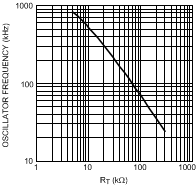
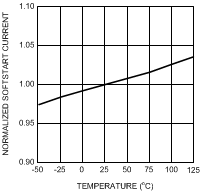
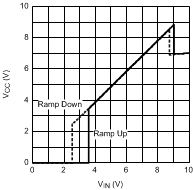
| RL = 7 kΩ | ||
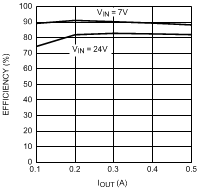
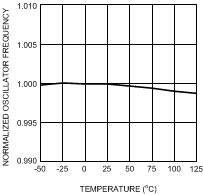
| FOSC = 200 kHz | ||
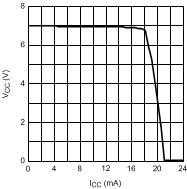
| VIN = 12V | ||
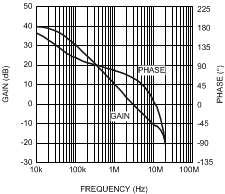
| AVCL = 101 | ||